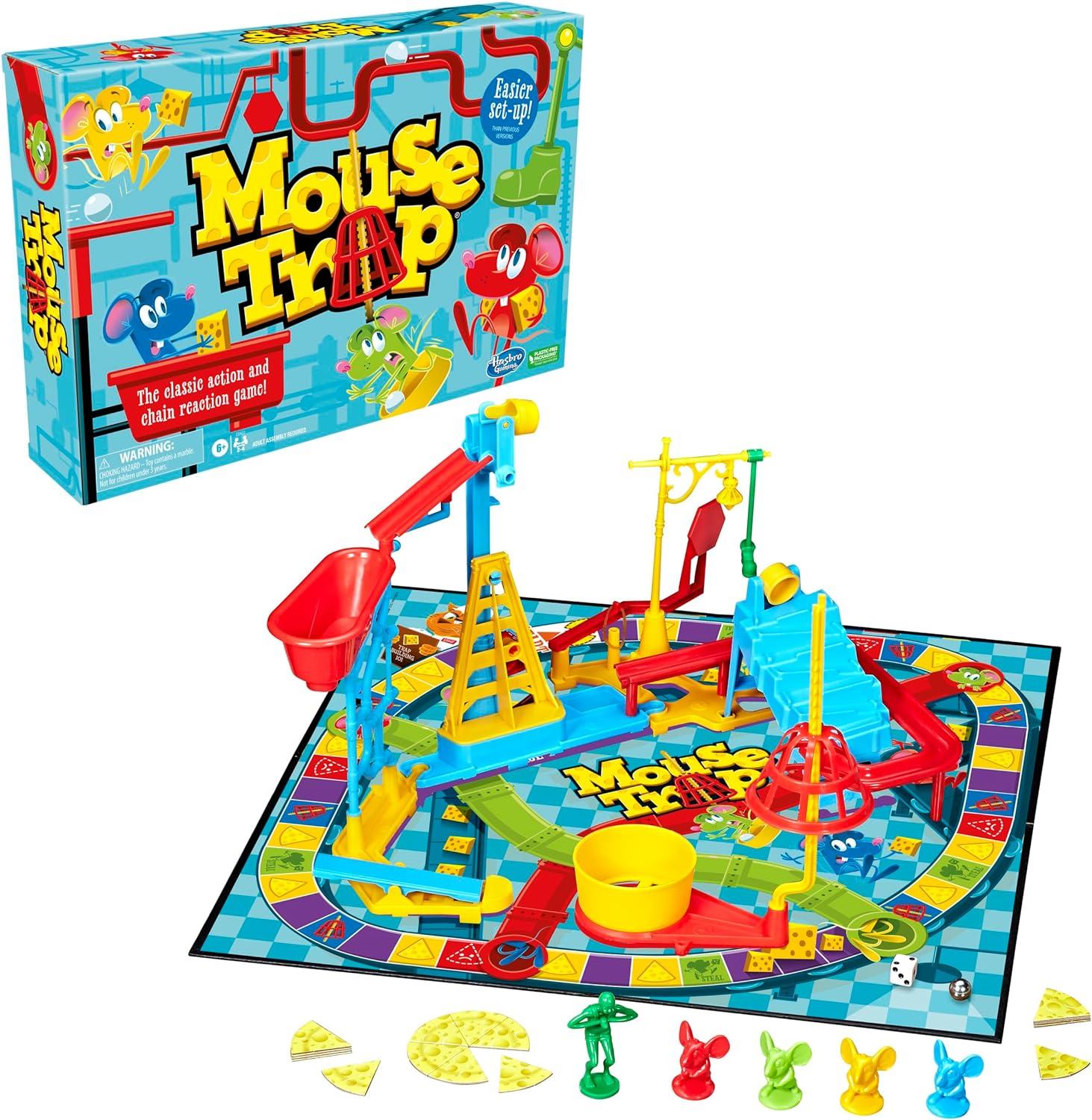Mouse Trap vs. Standard Game: Surprising Skills & Zany Fun for Kids Ages 6+ When it comes to childhood game time, the classics-think Guess Who?, Candy Land, or Scattergories-have long been the go-to for family fun. But what if there's a twist? Enter Hasbro Gaming Mouse Trap, a vibrant, high-energy board game that mixes strategy, physics, and a dash of chaos. While traditional games often rely on luck or memory, Mouse Trap challenges kids to think ahead, work as a team, and embrace the unpredictable. The Mouse Trap game is a masterclass in balance. With its colorful trap board, flying marbles, and the need to navigate a maze-like setup, it's not just about who lands the most traps-it's about patience and precision. Players must time their moves, sometimes racing against the clock (literally), to avoid sending the mouse careening into the trap. This blend of physical engagement and problem-solving makes it a standout for developing critical thinking and hand-eye coordination. On the other hand, the Classic Kids Game (a catch-all for traditional board games) offers a more straightforward experience. These games often hinge on simple rules, like matching cards or rolling dice, and are designed for easy setup and quick play. They're great for teaching turn-taking and basic math, but their repetitive nature might leave little room for creativity or surprise. So, which one wins the zany fun battle? Mouse Trap's slapstick mishaps-think marbles tumbling off the board, last-minute trap activations, or dramatic "mouse escapes"-are sure to spark laughter and excitement. The classic games, while reliable, can feel more like a predictable rhythm. However, the Classic Kids Game might have an edge in accessibility, appealing to younger players who thrive on simplicity. Ultimately, both games have their charm. The Mouse Trap adds a layer of dynamic play that keeps kids engaged with its physical and strategic elements, while the classic games provide a nostalgic, low-stakes alternative. Whether you're craving a brain-buster or a gigglesome adventure, the choice depends on your child's interests-and maybe a tiny bit of luck. Let the games begin!
Tested: Ransom Notes Offers More Family-Friendly Fun Than Cornhole When it comes to backyard entertainment, Cornhole has long been the go-to classic-a game of precision, strategy, and the satisfying thwack of a bag hitting a target. Yet, as the sun sets and the crowd grows, the Ultimate Bag Toss Yard Game often feels like a throwback to a simpler era, where humor and creativity take a backseat to competition. Enter Ransom Notes, the absurd, social media-savvy twist on word-based gameplay that's redefining what it means to have fun with friends (and maybe a few family members). At its core, Ransom Notes is a riotous experiment in linguistic chaos: players scramble to create baffling, meme-worthy sentences using random magnets, while others try to guess the intended message. It's equal parts frustration and laughter, a game that thrives on the unpredictability of a "create your own nonsense" approach. True, Cornhole's physicality and straightforward rules make it accessible, but Ransom Notes leans into the whimsy of collaboration, turning cryptic typos into inside jokes that ripple across generations. The WHAT DO YOU MEME? series-pocket-sized card games full of internet gibberish and absurd puns-might be fun, but they lack the tactile, group-building charm of Ransom Notes. Meanwhile, the Ninja NC301 Ice Cream Maker and Banneton Bread Proofing Basket offer their own brand of family-friendly joy, blending DIY creativity with the delight of making something delicious. The Ultimate Bag Toss Yard Game is undeniably portable and crowd-pleasing, but its repetitive nature can feel stale compared to the sparkling chaos of Ransom Notes. So if your goal is to spark conversation, laughter, and a little madness without the need for a keg or a ladder, Ransom Notes steals the show. It's the game that doesn't just compete-it creates a shared experience, proving that sometimes the best throwbacks are the ones that embrace the ridiculous.
Surprising Insight: Baseball Board Game Tested for Screen-Free Fun In an age where screens dominate our leisure time, the resurgence of baseball board games offers a charming counterpoint-a chance to reconnect with the sport's timeless charm without the glow of a device. Take MLB Slammin' Sluggers Baseball Game, a high-octane battle of wits and strategy where players mimic the thrill of a real game through physical pieces and dice rolls. It's a dynamic choice for those craving competitive action, though its fast-paced nature may leave casual fans craving a slower, more reflective experience. Meanwhile, What About Baseball Board Game leans into the social fabric of the sport, blending trivia, discussion, and lighthearted humor. Ideal for family game nights or group gatherings, it prioritizes engagement over competition, making it a versatile option for players of all ages. But if you're seeking depth over debate, the MLB All Teams Trivia Game delivers a comprehensive dive into the league's history, with questions spanning every team and era. Its educational bent appeals to history buffs, yet its inclusivity might feel overwhelming for those looking for simpler challenges. For a more mature approach, Grandma Smiley's Baseball Trivia Game Edition - 500 Cards, Ages 15+ offers a curated, nostalgic journey through the game's lore. With a focus on classic players and iconic moments, it's a nostalgic escape for older players, but its age restriction might deter younger audiences. Together, these games reveal that screen-free fun isn't just about avoiding technology-it's about rediscovering the joy of storytelling, strategy, and shared enthusiasm in a world that often moves too fast.



